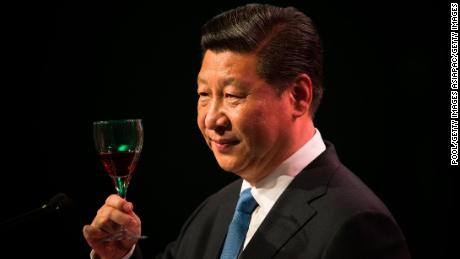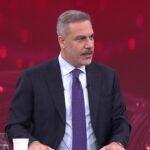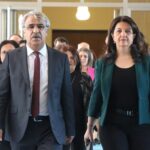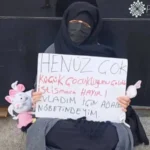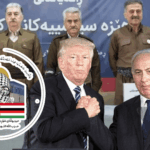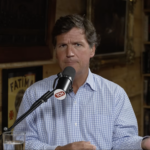Hong Kong (CNN)
President Xi Jinping called on China to take up its "due place in the world" in a confident, nationalistic speech Tuesday which underlined his strongman rule over the world's most populous country.
Speaking at the closure of the 13th National People's Congress, a meeting of the country's rubber-stamp parliament, Xi said the "rejuvenation of the Chinese nation has become the biggest dream of the Chinese people."
"We are resolved to fight the bloody battle against our enemies … with a strong determination to take our place in the world," Xi said.
The speech was a rallying call for Xi's second term as president, a role he looks highly likely to hold for life after the controversial removal of term limits. That move ensures his place as the country's unquestioned political supremo in a world where China's reach is extending further than ever before and rival superpower the United States is taking a back seat.
At many points in his televised speech he harkened back to the country's imperial past which critics have accused him of seeking to emulate as an emperor-like figure.
Xi listed China's historic achievements — such as the invention of paper, Confucianism, and building the Great Wall — and the country's experience of invasion from outside and "defending the national independence and freedom."
He had strong language for supporters of formal independence for Taiwan or Hong Kong, saying that "not a single inch of our land" could be ceded from China. The comments received loud applause from the hundreds of delegates gathered in the Great Hall of the People.
Taiwan has been self-governed since the end of the Chinese civil war in 1949, when the defeated nationalist government fled to the island. Beijing regards the island as a breakaway province to be retaken by force if necessary.
"We should safeguard the sovereignty and territorial integrity of the country and achieve full unification of the motherland," Xi said, adding unification was "the aspiration of all Chinese people."
Merriden Varrall, director of the East Asia Program at Australia's Lowy Institute, said the speech was clearly designed for a domestic audience, and strong language about Taiwan is a "sure fire way to get the Chinese people on your side."
However, she pointed out there was also a hint of uncertainty in how hard he sought to "draw on this pillar of legitimacy," emphasizing nationalist sentiment to shore up the Party's legitimacy in the wake of a surprising amount of discontent over the removal of term limits.
"The issues of Taiwan and Hong Kong are absolutely critical to most of the Chinese population in terms of how they judge whether or not the (Party is) doing its job," she said.
Xi's speech hit the same notes as a marathon three-hour address to Communist officials in October, after his political doctrine "Xi Jinping Thought" was added to the Party's constitution, raising him to a level no Chinese leader has held since Mao Zedong, the founder of Communist China.
That was the first formal move confirming predictions Xi would seek to stay on past the usual two five-year terms as President. In February it was announced presidential term limits would be abolished, clearing the way for Xi to serve for life.
Xi has been accused of pursuing a cult of personality similar to Mao's. During a session of the NPC confirming the change and reappointing Xi as President, television footage showed delegates in tears, and state media has begun referring to him as the country's "helmsman."
In his speech, Xi was keen to rally support for his vision, emphasizing his role as one among many, using the term "people" 84 times, compared to just 18 mentions of "socialism."
"The new era belongs to everyone, and everyone is a witness, pioneer, and builder of the new era. As long as we are united and struggle together, there will be no power to stop the Chinese people from realizing their dreams," he said.
However, according to Charles Burton, an expert in Chinese politics at Canada's Brock University, Xi's power is even more concentrated than Mao's, who he says was constrained by other leaders.
"By comparison, Xi Jinping has no such checks or balances, having already methodically purged potential rivals like Sun Zhengcai and Bo Xilai through anti-corruption campaigns. Xi has now assumed absolute control of the party, army and state," he said.
In his speech, Xi stressed the importance of reforming China's military and the absolute power of the Communist Party over the country.
"We should make sure the (Party) has ultimate leadership over the military and in a new era continue to strengthen … the military with science and technology and rule-based governance," he said.
"(The Party) is the supreme leadership of the country (and) holds ultimate leadership over every aspect of our social and political life."
Xi's installation as China's absolute leader comes as his ally Vladimir Putin scored a record third term as Russian President with a landslide win in an election in which no real opposition was permitted to run.
While Putin is more constrained by needing to keep to at least the appearance of representative democracy, he and Xi are the most prominent of a host of world leaders rolling back voting rights and shoring up their own authority.
Putin is cleared to rule Russia for six more years, and some analysts predicted he may follow Xi's lead and remove term limits in order to serve indefinitely, pointing to the lack of a likely successor to the presidency.
"The action of Xi Jinping is kind of a road map for Putin," Andrei Kolesnikov, a senior fellow at the Carnegie Moscow Center, told CNN.
CNN's Yuli Yang, Steven Jiang, Serenitie Wang and Katie Hunt contributed reporting.
Yazıyı beğendiysen, patronumuz olur musun?
Evet, çok ciddi bir teklif bu. Patronumuz yok. Sahibimiz kar amacı gütmeyen bir dernek. Bizi okuyorsan, memnunsan ve devam etmesini istiyorsan, artık boş olan patron koltuğuna geçmen lazım.
Serbestiyet; Türkiye'nin gri alanı. Siyah ve beyazlar içinde bu gri alanı korumalıyız. Herkese bir gün gri alanlar lazım olur.




